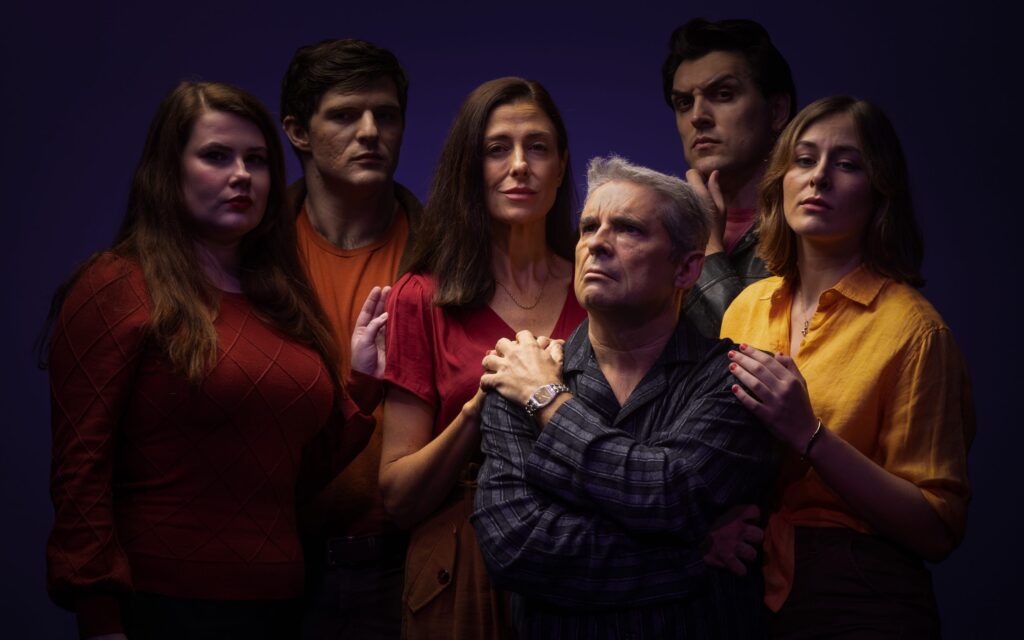
‘The Father’ // PIP Theatre
‘The Father’ was unsettling.
Dementia is a heartbreaking illness that affects more than 400,000 Australians each year. ‘The Father’ written by Florian Zeller is a poignant reminder of just how destabilising the condition is for those living with the illness and their loved ones. Pip Theatre should be highly commended for sharing this important story with passion and sensitivity.
The story is seen through Andre’s eyes, a father living with dementia. Written in a nonlinear timeline the script is disorienting for the audience mirroring how The Father, Andre (Tony Nixon) feels.
The heart-wrenching script elicits a strong emotional response without going too far and should be commended for giving a voice to the many who have lost the dignity to control their life and their story.
Originally written in French, Florian Zeller’s script was translated by Christopher Hampton. While the text was clearly embedded with French references and names, this did not detract as the performance felt universal.
Angela Witcher’s direction was thoughtful. It embraced the multi-faceted script from steering into both the sinister undertones and necessary moments of comedic relief. Witcher’s direction seemed to evoke a dream like quality echoing Andre’s convoluted stream of consciousness. Of particular note was Witcher’s direction of the scene changes. Every transition was a perfectly choreographed dance demonstrating the transitory nature of Andre’s confident realities.
Witcher’s skilful direction along with the ensemble cast of five worked cohesively together to make the disjointed narrative flow with the conviction of a linear storyline. Every cast member delivered a committed and considered performance and were dynamic to watch.
Tony Nixon as Andre was mesmerising and delivered a masterclass in acting. The perfect mix of fearless and feeble, he flawlessly portrayed the fear, confusion and denial of a person struggling to understand his decline in grasping the world around him. Nixon produced bursts of gusto throughout the play as he clung to his understanding of the realities he believed to be true, and vulnerability as he degenerated into accepting his confusion and internal and external cruelties. Nixon also created subtle nuances and nervous tics that further brought Andre to life creating a complex and complete character.
His daughter Anne, played by Janelle Bailey, was his primary carer and bore the brunt of the emotional toll of caring for her father. While sympathetic to her father’s condition, Anne admits that she cannot keep her life revolving around him. Bailey’s performance was stoic and clearly conveyed her turmoil of wanting to do right by her father but was often met with a lack of appreciation or regard by Andre. Her performance particularly shone in a scene where Andre offhandedly comments on his disappointment towards Anne while reminiscing over his love for Anne’s absent sister. Bailey’s heartache and sadness was palpable and deeply moving to watch.
As Laura, the one carer that Andre seemed to enjoy, Jade Moon brought a youthful spirit that seemed to soften Andre’s confrontational exterior. Ophelia Novak portrayed multiple characters through the show including a version of Anne adding to the confusion in Andre’s reality. Her performance at the end as a nurse in Andre’s nursing home is suitably professional and sterile highlighting the lack of empathy and dehumanising that can appear in the care system.
Rounding out the cast were Reagan Warner and Jesse Blachut as Anne’s husband Pierre (or Antoine according to Andre). Warner and Blachut were dominating and sinister presences and delivered some of the most confronting scenes in the show. An accomplished performer, Warner was striking as the villain Pierre. At his wits end for adapting for Andre, he is dismissive and cruel to him while appearing empathetic to Anne’s plight. Similarly, Blachut was commanding and unnerving in the role. Blachut doubled as an incarnation of Pierre and a nurse at Andre’s nursing home at the end of the play, this juxtaposition of elder abuse with a professional carer was an unsettling subtlety that drove home the vulnerability people struggling with dementia face.
Lighting design by Timothy James helped to create the mood of the scenes and reflected Andre’s inner turmoil. For example, the more confused Andre seemed to become the dimmer the lights got as his reality faded further away.
PIP Theatre’s intimate space was the perfect platform for this show. Set in both Andre and Anne’s apartments the confined setting mimicked Andre being trapped in his reality and contained within in his internal turmoil.
Set design by Witcher and Ava Moschetti was homey and warm with vibrant paintings, a chic liquor cabinet and plush furnishings. As the play transitioned, the various living spaces became more sterile and stark demonstrating Andre’s continual loss of his home, comfort and reality.
‘The Father’ is a gripping and heartfelt piece of theatre that explores the themes of family, connection and loss. Pip Theatre beautifully conveyed this story and should be highly commended for delivering a thought-provoking performance. It was an immersive and riveting insight into such a cruel illness and is something that will resonate with anyone who’s ever been part of a family.
‘The Father’ plays at Pip Theatre until June 24th. Tickets are available on the Pip Theatre website.






